Key takeaways:
- Ocean conservation is essential for protecting marine ecosystems and supporting livelihoods dependent on the ocean.
- Coral reefs serve as critical habitats and natural barriers, and their decline threatens both biodiversity and coastal communities.
- Responsible snorkeling practices, including eco-friendly gear and awareness of movements, are vital to minimize human impact on coral reefs.
- Supporting local conservation efforts through volunteering and education enhances the snorkeling experience and fosters a connection to marine environments.
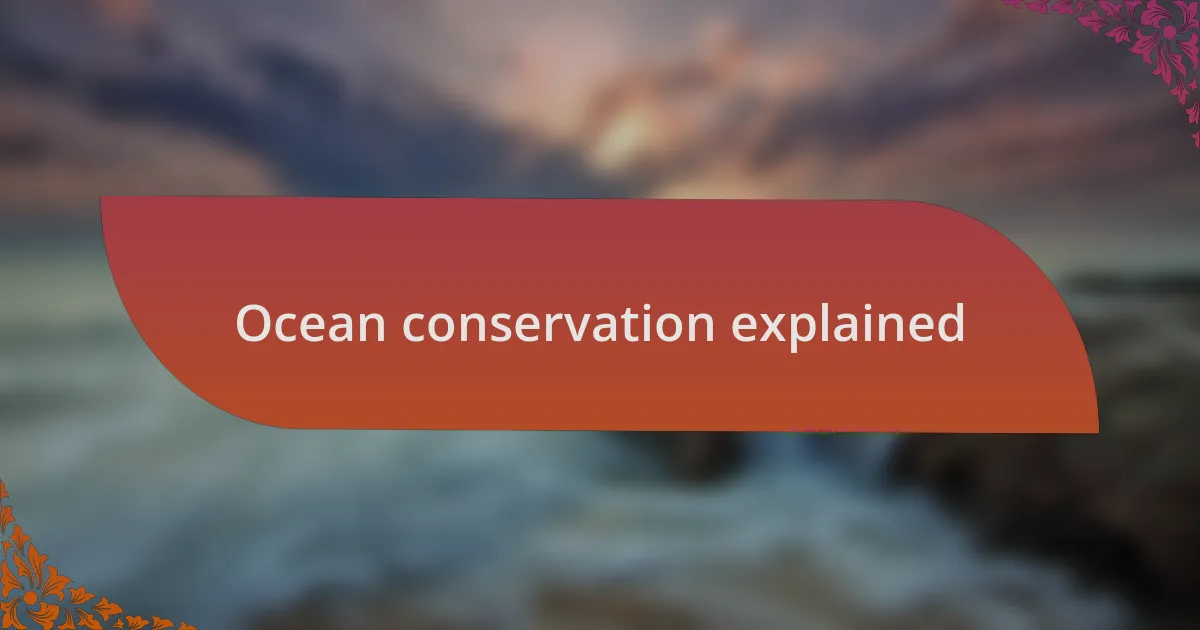
Ocean conservation explained
Ocean conservation encompasses the efforts to protect marine ecosystems and ensure the sustainable use of ocean resources. My first encounter with the delicate balance of these ecosystems came while snorkeling in vibrant coral reefs. It’s hard not to feel a sense of awe when surrounded by the bustling life beneath the surface, which made me realize just how fragile these habitats truly are.
When I swam among the corals, I couldn’t help but ponder: what would happen if these stunning formations failed to thrive? That thought stuck with me. The loss of coral reefs means more than just losing beauty; it impacts countless species and the livelihoods of communities that rely on the ocean. Hearing about how climate change and pollution threaten these ecosystems can feel overwhelming, but personal experiences in the water remind us of what’s at stake.
Ocean conservation isn’t merely a scientific endeavor; it’s a deeply emotional commitment. I remember the sobering moment when I witnessed coral bleaching firsthand, a stark reminder that we are all interconnected. It raised questions in my mind about our responsibility as stewards of the sea. Every small action toward conservation—whether it’s supporting sustainable seafood choices or advocating for protected marine areas—can lead to significant positive changes. Have you thought about what part you could play in this vital mission?
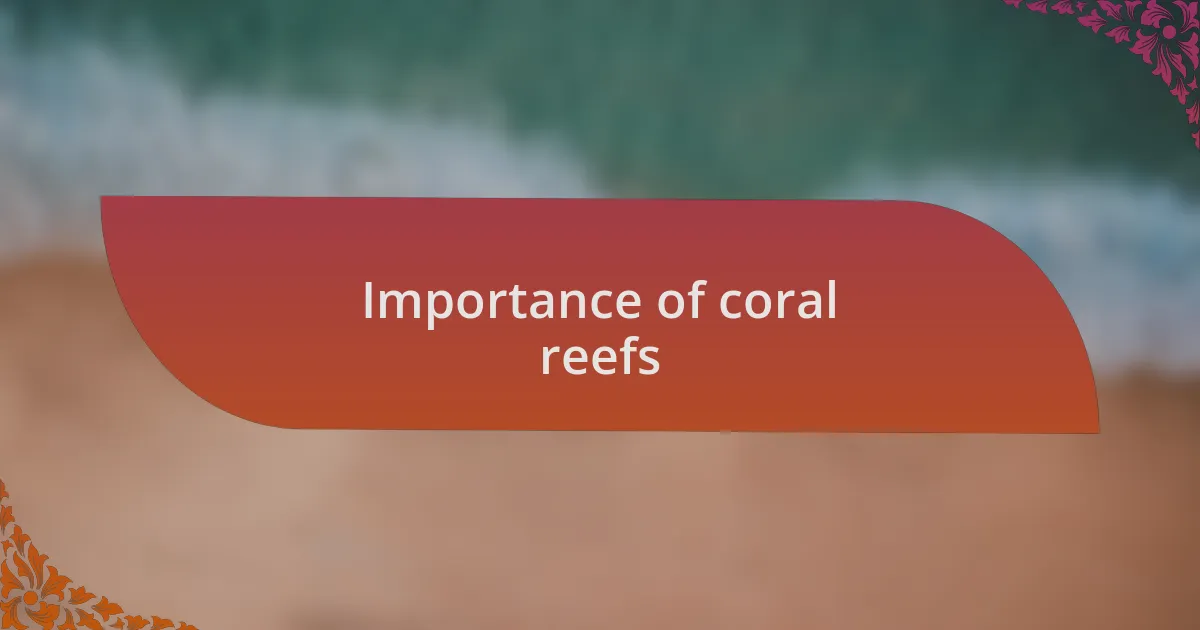
Importance of coral reefs
Coral reefs are often referred to as the rainforests of the sea because they support an incredible diversity of life. When I was snorkeling, I felt as if I was swimming through a bustling city, teeming with colorful fish, sea turtles, and a myriad of other creatures. It struck me then just how vital these structures are—not just as habitats, but as the foundation for entire marine ecosystems that sustain so many species.
Beyond their biological importance, coral reefs provide significant economic benefits to coastal communities through tourism and fisheries. I still recall the exhilaration I felt when I spotted a school of snapper darting through a coral garden. Such encounters highlight the direct link between vibrant reefs and the livelihoods of local populations. What if we lose these reefs? A decline in coral health could devastate local economies, and that reality is not just a distant concern; it’s happening now.
The role of coral reefs in buffering coastlines against storms and erosion cannot be overstated. As I floated over a reef during a mild swell, I marveled at how they acted as natural breakwaters. Imagine the potential devastation if these natural barriers were diminished! It’s clear to me that protecting coral reefs is not just an environmental issue; it’s a matter of protecting our homes and lives. How can we afford to ignore such a crucial part of our planet?
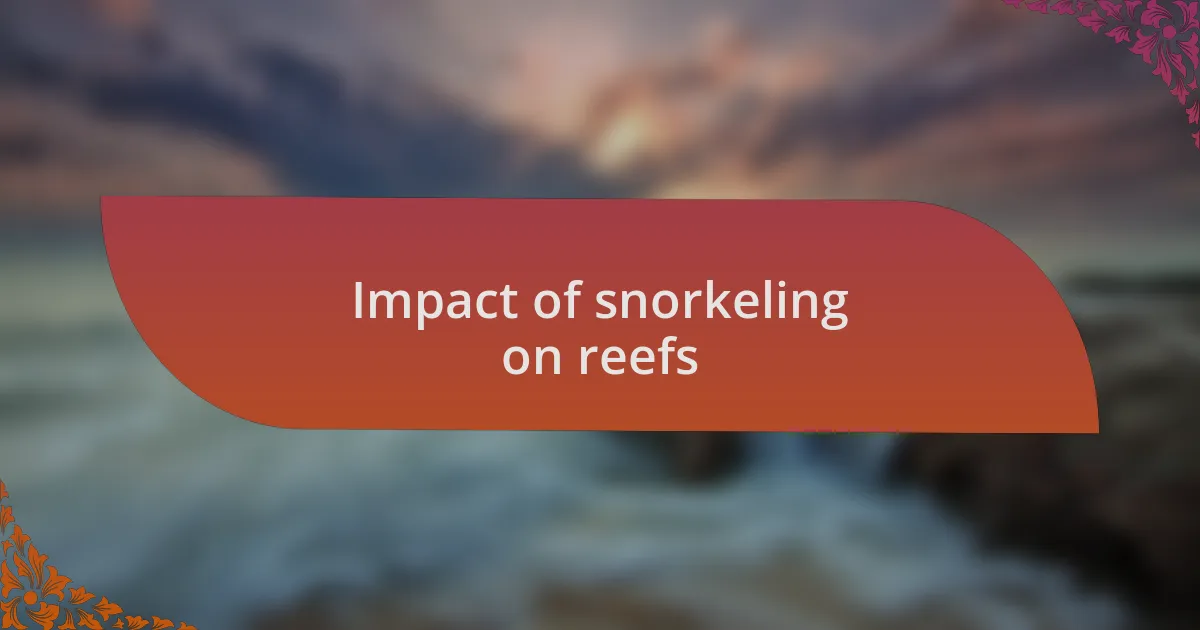
Impact of snorkeling on reefs
Snorkeling can create delightful experiences, but it also poses risks to coral reefs. When I first ventured into the clear waters, I couldn’t help but notice the vibrant corals below. However, as I paddled around to get a closer look, I began to wonder—could my fins inadvertently harm these delicate ecosystems? With each gentle kick, I realized how important it was to be mindful of my movements.
The impact of human interaction through snorkeling can be far-reaching. I vividly recall witnessing a group of snorkelers clumsily bumping into a coral formation, which damaged several polyps—a critical part of the reef’s living structure. This made me reflect on the importance of education and responsible snorkeling practices. If we want to enjoy these underwater paradises, shouldn’t we also learn how to protect them?
Moreover, increased snorkeling activities can contribute to coral bleaching, especially when combined with rising water temperatures. I felt a pang in my heart as I observed patches of white on the once-lively corals, signaling that they were stressed. How can we reconcile our love for the ocean with our responsibility to protect its inhabitants? It felt like a call to action, emphasizing the importance of sustainable practices in our adventures below the surface.
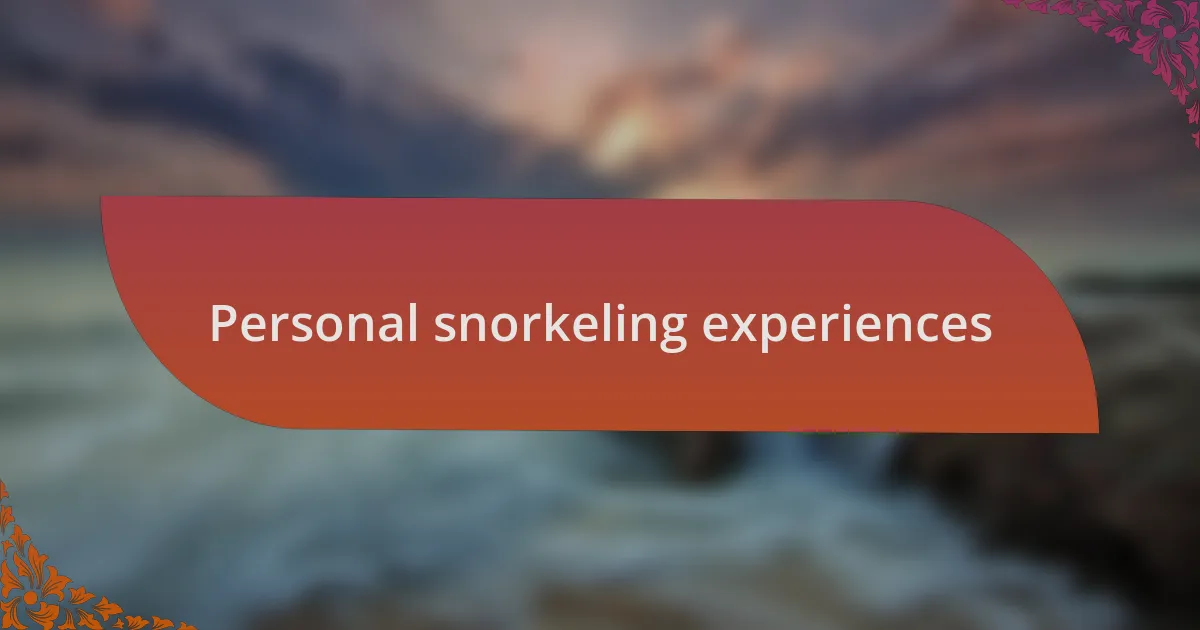
Personal snorkeling experiences
One of my most memorable snorkeling experiences occurred in the vibrant waters of a coral reef in Belize. As I glided just above the corals, I was captivated by the ballet of colorful fish weaving through the intricate structures. But then, I noticed a creeping anxiety; was I truly careful enough not to disturb the delicate balance of this underwater world? It struck me then how easily one slip could lead to unintended harm.
On another outing, I encountered a stunning coral garden, teeming with life, but I felt an overwhelming sense of sadness as I spotted patches of coral that appeared bleached. It reminded me of a once-thriving neighborhood now dulled and neglected. That image tugged at my heartstrings—could it be that my own adventures contributed to these changes? It was a wake-up call, highlighting the fragile nature of these wonders and igniting a desire in me to become a more responsible snorkeler.
During a snorkeling trip off the coast of Thailand, I learned something profound: being aware of my surroundings can significantly transform the experience. When I focused on my movements, I felt more connected to the ocean, almost as if I was an integral part of the ecosystem rather than just a visitor. This realization led me to ask myself, how could I inspire others to have the same respect? I left that day with renewed passion, determined to share my experiences and advocate for responsible snorkeling practices that protect these precious environments.
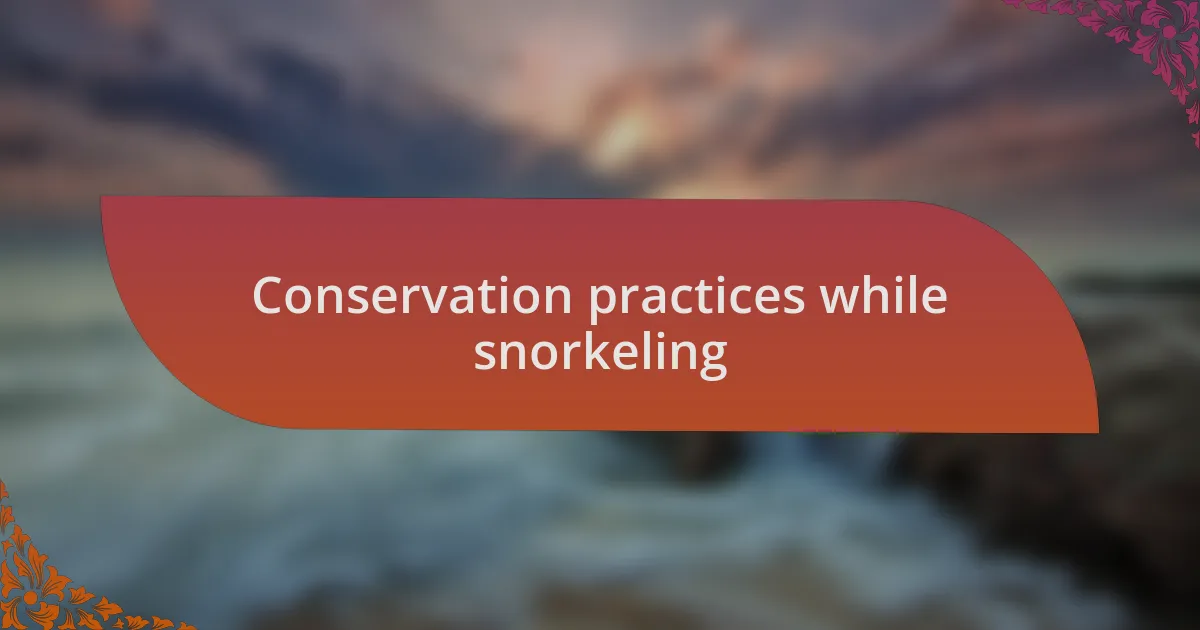
Conservation practices while snorkeling
Practicing responsible snorkeling starts with preparation. Before I even stepped foot into the water, I made sure my gear was eco-friendly and my sunscreen was reef-safe. It was surprising to learn how some lotions can harm coral reefs, so opting for the right products felt like an easy but impactful way to protect the ocean.
While snorkeling, I always remind myself to maintain a respectful distance from the corals. I vividly recall an experience when I accidentally kicked a small rock and disturbed a delicate sea anemone. The ripple effect of my actions left me feeling uneasy. This moment reinforced the belief that maintaining a calm, controlled movement not only enhances my experience but also keeps the reef safe from harm.
Lastly, I believe that sharing knowledge is a vital conservation practice. On one trip, I had the chance to snorkel with a guide who explained the significance of marine species and their roles in the ecosystem. It felt empowering to learn and then share that knowledge with other snorkelers. How often do we take the time to educate ourselves and those around us? Embracing that responsibility turns our snorkeling adventures into opportunities for advocacy and stewardship, ensuring that these beautiful underwater realms thrive for generations to come.
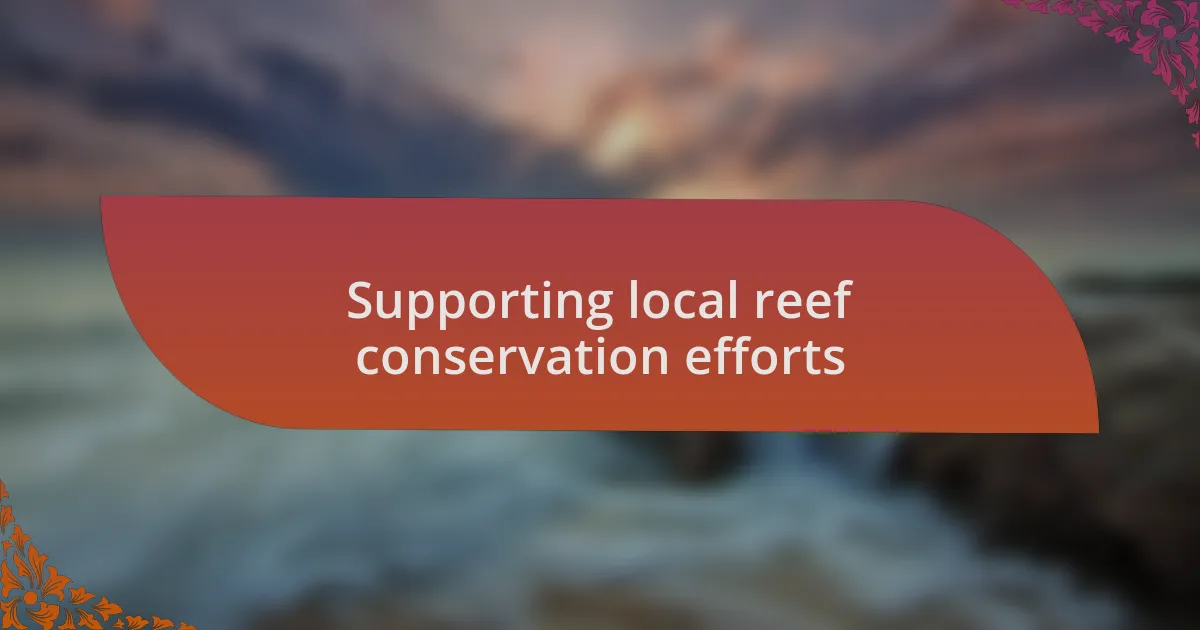
Supporting local reef conservation efforts
As I’ve ventured into various snorkeling spots, I often find local organizations dedicated to protecting these delicate ecosystems. One trip took me to a community-run effort where every snorkeler was encouraged to contribute to reef restoration projects. It felt rewarding to know that my presence was directly supporting the very corals I was enjoying, creating a sense of connection with both the people and the environment.
Participating in beach clean-ups or coral planting days has genuinely changed how I view my role as a snorkeler. I remember one particularly sunny morning spent working side by side with locals, restoring habitats while sharing stories about our ocean experiences. This hands-on involvement not only strengthened my appreciation for the reefs but also fostered friendships with those who share my passion for conservation. Isn’t it amazing how collective efforts can amplify the impact we each have?
I encourage everyone to seek out local conservation initiatives while traveling. Whether it’s donating to a reef preservation fund or volunteering at a marine sanctuary, these actions resonate deeply within me. Reflecting on how small contributions can collectively lead to significant changes is profound and truly inspires me to keep advocating for our oceans. What if we all took one small step for the reefs? The potential for positive change is limitless.